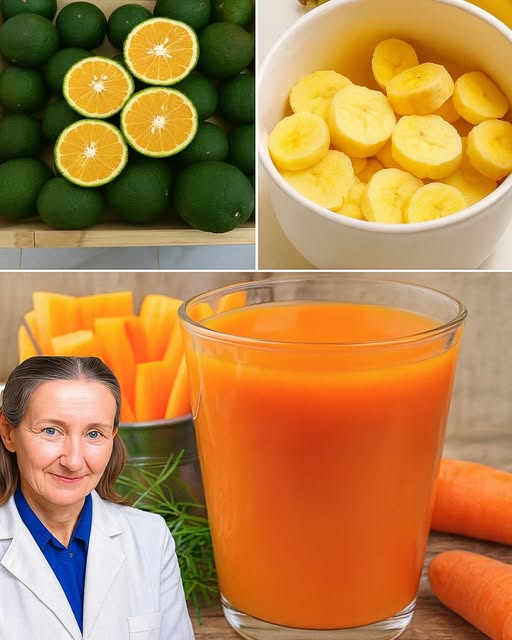Promote Overall Wellness and Eye Health
Antioxidants and anti-inflammatory substances found in this vibrant orange smoothie (carrot, banana, orange, and turmeric) promote overall wellness and eye health. The nutrients here, beta-carotene (a precursor to vitamin A), vitamin C, potassium, and curcumin, can support healthy eyes and may reduce risk factors associated with some eye problems when used as part of a balanced diet and regular medical care.
Ingredients:
1 medium carrot, peeled and chopped
2 ripe bananas, peeled and chopped
2 medium oranges, peeled and sectioned (remove seeds)
½ teaspoon ground turmeric (or fresh grated turmeric)
2 glasses (about 400–500 ml) cold water — adjust for desired thickness
Optional: tiny pinch of black pepper to increase turmeric absorption (use cautiously; see precautions)
Detailed health benefits (what each ingredient brings):
Carrot (beta-carotene → vitamin A): Beta-carotene is converted by the body into vitamin A, which is essential for normal vision (particularly adapting to low light) and maintaining the surface tissues of the eye. In people with vitamin A deficiency, improving intake helps vision. In well-nourished people, carrots help contribute to overall eye nutrient status but are not a cure for structural eye disease.
Orange (vitamin C + antioxidants): Vitamin C is an antioxidant found in high amounts in citrus fruits; higher long-term vitamin C intake has been associated in some studies with a lower risk of cataract formation and reduced oxidative stress in the lens. This may help slow cataract progression but is not a guaranteed prevention or reversal.
Banana (potassium, vitamin B6, small amount vitamin C & antioxidants): Provides energy, electrolytes (potassium), and some antioxidant support; helpful for general health and wellbeing, though bananas are not a specific eye-disease treatment. People with kidney disease should watch potassium intake.
Turmeric (curcumin — anti-inflammatory/antioxidant): Curcumin shows promising anti-inflammatory and antioxidant effects in many preclinical and some clinical eye studies (glaucoma, macular degeneration, dry eye and others). Evidence is still emerging — turmeric may help reduce inflammation and oxidative damage, but it is not a proven standalone therapy for serious eye conditions.
Step-by-step instructions:
Wash everything thoroughly. Peel the carrot, bananas and oranges.
Chop the carrot into small chunks so your blender can handle it easily.
Cut bananas into slices and peel & section the oranges (remove seeds).
Put carrot, banana, orange into the blender. Add ½ teaspoon ground turmeric. (Optionally add the tiniest pinch of black pepper if you’re not on blood-thinning meds — black pepper increases curcumin absorption.)
Pour in about 2 glasses (400–500 ml) of water. If you like it thicker, reduce water; for a thinner drink add more.
Blend on high for 20–40 seconds (or until smooth). If your blender struggles, blend carrot + water first, then add fruit and turmeric and blend again.
Pour into a glass and drink. Clean blender promptly.
How often / Best time to use:
Follow the routine you suggested: one glass per day, 30 minutes before breakfast for up to seven consecutive days if you want a short boost. Taking it in the morning makes practical sense (fasted nutrient uptake, convenient).
For long-term eye health, make antioxidant-rich fruits and vegetables a regular part of your diet rather than relying on short short-term “cures.” (Sustained dietary patterns and medical follow-up matter.)
How it may work (mechanisms):
Antioxidants (beta-carotene, vitamin C, polyphenols) reduce oxidative stress on the eye’s lens and retina; oxidative damage is a key driver of cataract and some retinal diseases.
Anti-inflammatory actions (curcumin) may reduce chronic inflammation that contributes to degenerative eye conditions. Preclinical and early clinical work suggests curcumin can modulate inflammatory pathways relevant to glaucoma, macular degeneration and other disorders — but human evidence is still limited.
Nutrient support (vitamins and minerals) helps maintain normal eye structures and function; this is supportive care rather than a cure.
Safety, precautions, and interactions (important):
Do not stop or replace prescribed treatments for glaucoma, cataract, macular degeneration, or migraine with this smoothie. See an eye doctor if you have vision changes.
Turmeric/curcumin interactions: curcumin can interact with blood thinners (e.g., warfarin), antiplatelet medications, some diabetes meds, and other drugs — and may increase bleeding risk in some people. If you take anticoagulants or are on multiple medicines, check with your clinician first. Avoid high-dose turmeric supplements without medical advice.
Potassium: bananas are high in potassium — if you have kidney disease or take potassium-sparing meds, check with your doctor.
Allergies & pregnancy: if you’re allergic to any ingredient or pregnant/breastfeeding, consult a clinician before starting any new concentrated regimen.
Black pepper: a small pinch enhances curcumin absorption but can also increase interactions; avoid black pepper if you’re concerned about drug effects.
Expectations: if vision is blurred, getting worse, or you have pain or sudden changes, seek immediate medical care — do not rely on home remedies.
Quick Q&A
Q: Will this smoothie remove cataracts or reverse glaucoma?
A: No reliable evidence shows this or any smoothie will reverse established cataracts or glaucoma. Some nutrients may reduce risk or slow progression as part of a healthy diet, but medical treatment (and surgery for cataracts when indicated) is often required.
Q: Any side effects from drinking one glass daily?
A: Generally safe for most healthy adults in the amounts listed. Watch for stomach upset from turmeric in sensitive people; monitor if you’re on interacting medications.

